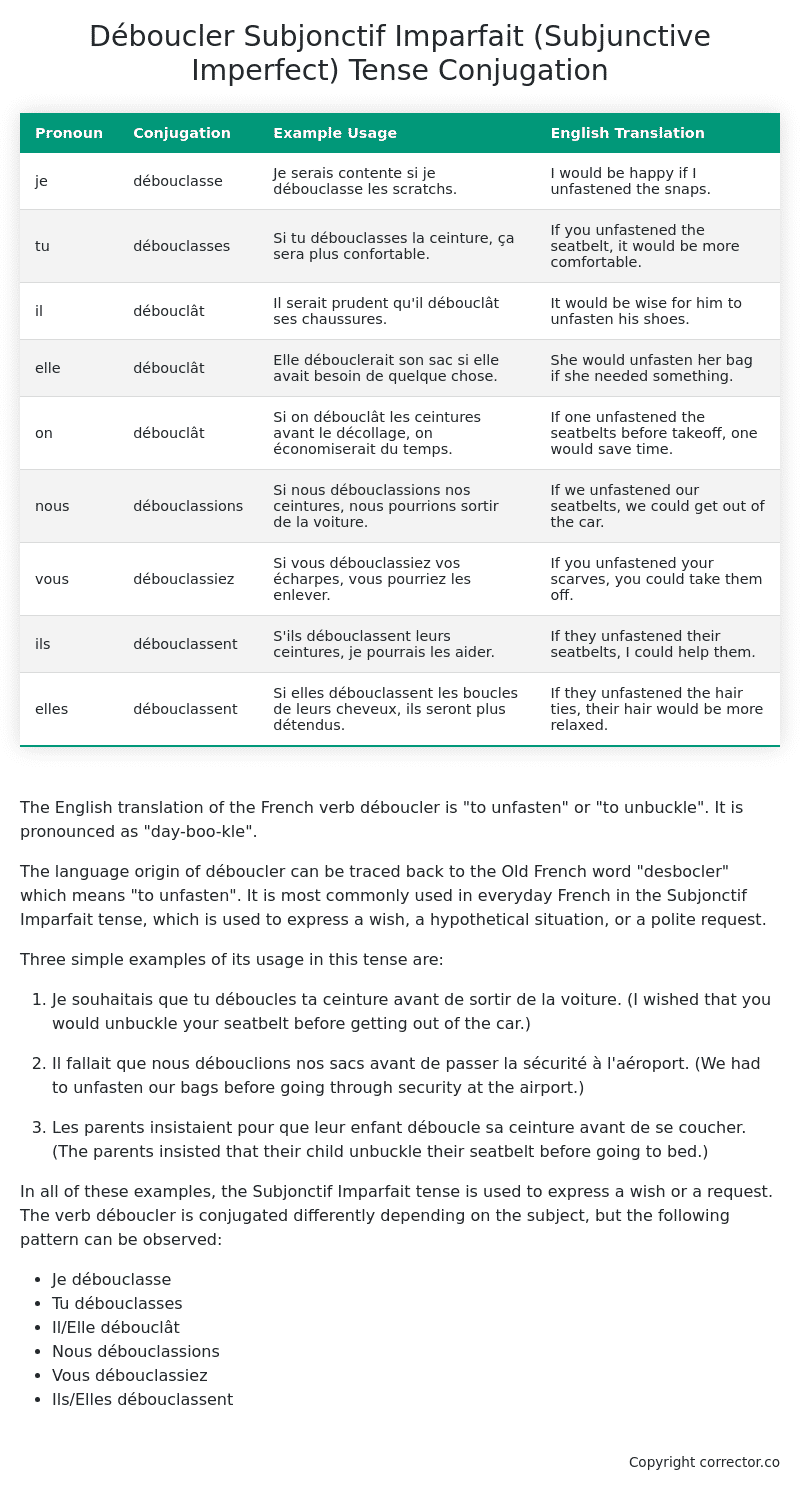Subjonctif Imparfait (Subjunctive Imperfect) Tense Conjugation of the French Verb déboucler
Introduction to the verb déboucler
The English translation of the French verb déboucler is “to unfasten” or “to unbuckle”. It is pronounced as “day-boo-kle”.
The language origin of déboucler can be traced back to the Old French word “desbocler” which means “to unfasten”. It is most commonly used in everyday French in the Subjonctif Imparfait tense, which is used to express a wish, a hypothetical situation, or a polite request.
Three simple examples of its usage in this tense are:
-
Je souhaitais que tu déboucles ta ceinture avant de sortir de la voiture. (I wished that you would unbuckle your seatbelt before getting out of the car.)
-
Il fallait que nous débouclions nos sacs avant de passer la sécurité à l’aéroport. (We had to unfasten our bags before going through security at the airport.)
-
Les parents insistaient pour que leur enfant déboucle sa ceinture avant de se coucher. (The parents insisted that their child unbuckle their seatbelt before going to bed.)
In all of these examples, the Subjonctif Imparfait tense is used to express a wish or a request. The verb déboucler is conjugated differently depending on the subject, but the following pattern can be observed:
- Je débouclasse
- Tu débouclasses
- Il/Elle débouclât
- Nous débouclassions
- Vous débouclassiez
- Ils/Elles débouclassent
Table of the Subjonctif Imparfait (Subjunctive Imperfect) Tense Conjugation of déboucler
| Pronoun | Conjugation | Example Usage | English Translation |
|---|---|---|---|
| je | débouclasse | Je serais contente si je débouclasse les scratchs. | I would be happy if I unfastened the snaps. |
| tu | débouclasses | Si tu débouclasses la ceinture, ça sera plus confortable. | If you unfastened the seatbelt, it would be more comfortable. |
| il | débouclât | Il serait prudent qu’il débouclât ses chaussures. | It would be wise for him to unfasten his shoes. |
| elle | débouclât | Elle débouclerait son sac si elle avait besoin de quelque chose. | She would unfasten her bag if she needed something. |
| on | débouclât | Si on débouclât les ceintures avant le décollage, on économiserait du temps. | If one unfastened the seatbelts before takeoff, one would save time. |
| nous | débouclassions | Si nous débouclassions nos ceintures, nous pourrions sortir de la voiture. | If we unfastened our seatbelts, we could get out of the car. |
| vous | débouclassiez | Si vous débouclassiez vos écharpes, vous pourriez les enlever. | If you unfastened your scarves, you could take them off. |
| ils | débouclassent | S’ils débouclassent leurs ceintures, je pourrais les aider. | If they unfastened their seatbelts, I could help them. |
| elles | débouclassent | Si elles débouclassent les boucles de leurs cheveux, ils seront plus détendus. | If they unfastened the hair ties, their hair would be more relaxed. |
Other Conjugations for Déboucler.
Le Present (Present Tense) Conjugation of the French Verb déboucler
Imparfait (Imperfect) Tense Conjugation of the French Verb déboucler
Passé Simple (Simple Past) Tense Conjugation of the French Verb déboucler
Passé Composé (Present Perfect) Tense Conjugation of the French Verb déboucler
Futur Simple (Simple Future) Tense Conjugation of the French Verb déboucler
Futur Proche (Near Future) Tense Conjugation of the French Verb déboucler
Plus-que-parfait (Pluperfect) Tense Conjugation of the French Verb déboucler
Passé Antérieur (Past Anterior) Tense Conjugation of the French Verb déboucler
Futur Antérieur (Future Anterior) Tense Conjugation of the French Verb déboucler
Subjonctif Présent (Subjunctive Present) Tense Conjugation of the French Verb déboucler
Subjonctif Passé (Subjunctive Past) Tense Conjugation of the French Verb déboucler
Subjonctif Imparfait (Subjunctive Imperfect) Tense Conjugation of the French Verb déboucler (this article)
Subjonctif Plus-que-parfait (Subjunctive Pluperfect) Tense Conjugation of the French Verb déboucler
Conditionnel Présent (Conditional Present) Tense Conjugation of the French Verb déboucler
Conditionnel Passé (Conditional Past) Tense Conjugation of the French Verb déboucler
L’impératif Présent (Imperative Present) Tense Conjugation of the French Verb déboucler
L’infinitif Présent (Infinitive Present) Tense Conjugation of the French Verb déboucler
Struggling with French verbs or the language in general? Why not use our free French Grammar Checker – no registration required!
Get a FREE Download Study Sheet of this Conjugation 🔥
Simply right click the image below, click “save image” and get your free reference for the déboucler Subjonctif Imparfait tense conjugation!

Déboucler – About the French Subjonctif Imparfait (Subjunctive Imperfect) Tense
Formation
Common Everyday Usage Patterns
Interactions with Other Tenses
Subjonctif Présent
Indicatif Passé Composé
Conditional
Conditional Perfect
Summary
I hope you enjoyed this article on the verb déboucler. Still in a learning mood? Check out another TOTALLY random French verb conjugation!


